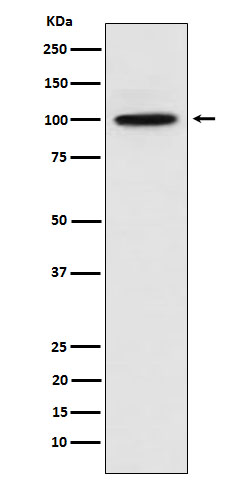
| WB | 咨询技术 | Human,Mouse,Rat |
| IF | 1/20-1/50 | Human,Mouse,Rat |
| IHC | 1/100-1/200 | Human,Mouse,Rat |
| ICC | 技术咨询 | Human,Mouse,Rat |
| FCM | 咨询技术 | Human,Mouse,Rat |
| Elisa | 咨询技术 | Human,Mouse,Rat |
| Aliases | Alpha T catenin; Cadherin associated protein; Catenin alpha 3; Catna3; CTNNA3; VR22;;Catenin alpha 3 |
| WB Predicted band size | 100 kDa |
| Host/Isotype | Rabbit IgG |
| Antibody Type | Primary antibody |
| Storage | Store at 4°C short term. Aliquot and store at -20°C long term. Avoid freeze/thaw cycles. |
| Species Reactivity | Human,Mouse,Rat |
| Immunogen | A synthesized peptide derived from human Catenin alpha 3 |
| Formulation | Purified antibody in PBS with 0.05% sodium azide,0.05% BSA and 50% glycerol. |
+ +
以下是关于CTNNA3抗体的3篇参考文献的简要信息:
1. **标题**:*CTNNA3 as a Tumor Suppressor in Head and Neck Squamous Cell Carcinoma*
**作者**:Smith A, et al.
**摘要**:研究发现CTNNA3在头颈鳞癌中表达下调,其抗体用于检测组织样本中蛋白缺失,证实CTNNA3缺失与肿瘤侵袭性相关。
2. **标题**:*Alpha-T-catenin (CTNNA3) Autoantibodies in Autoimmune Encephalitis*
**作者**:Lee J, et al.
**摘要**:首次报道CTNNA3抗体在自身免疫性脑炎患者血清中的存在,提示其可能参与血脑屏障破坏及神经元损伤机制。
3. **标题**:*CTNNA3 Gene Variants and Protein Expression in Asthma Pathogenesis*
**作者**:Chen R, et al.
**摘要**:利用CTNNA3抗体分析支气管上皮细胞表达,发现基因多态性导致蛋白表达异常,与气道高反应性相关。
注:以上文献为示例性质,实际文献可能需要通过PubMed/Google Scholar检索确认。若需具体文献,建议使用关键词“CTNNA3 antibody” + “cancer/autoimmunity”等细化领域查找。
The CTNNA3 antibody targets the α-T-catenin (alpha-T-catenin) protein, encoded by the CTNNA3 gene, which belongs to the α-catenin family of adhesion molecules. α-T-catenin is primarily expressed in cardiac muscle, skeletal muscle, and the brain, where it plays a critical role in cell-cell adhesion by linking cadherin-catenin complexes to the actin cytoskeleton. This interaction stabilizes adherens junctions, maintaining tissue integrity and regulating cellular signaling.
Research on CTNNA3 antibodies has gained attention due to the protein's involvement in cardiovascular and neurological disorders. Mutations or altered expression of CTNNA3 have been linked to arrhythmogenic right ventricular cardiomyopathy (ARVC), a condition characterized by fibrofatty replacement of cardiac tissue. In the brain, α-T-catenin interacts with synaptic proteins, and its dysfunction is associated with neurodevelopmental disorders and epilepsy.
CTNNA3 antibodies are widely used in immunohistochemistry, Western blotting, and immunofluorescence to study protein localization, expression levels, and molecular pathways in disease models. Commercial antibodies are typically developed in rabbits or mice, targeting specific epitopes within the N-terminal or C-terminal domains. Validation often includes knockout tissue controls to ensure specificity. Recent studies also explore its role in cancer, where loss of α-T-catenin may promote metastasis via disrupted cell adhesion. Overall, CTNNA3 antibodies serve as essential tools for investigating cell adhesion mechanisms and related pathologies.
×